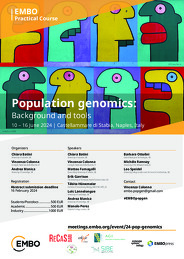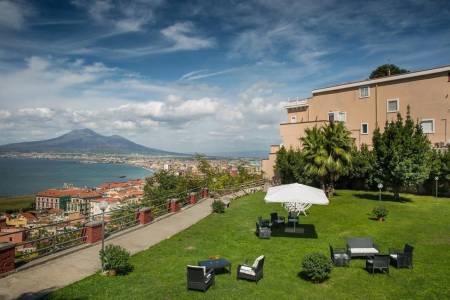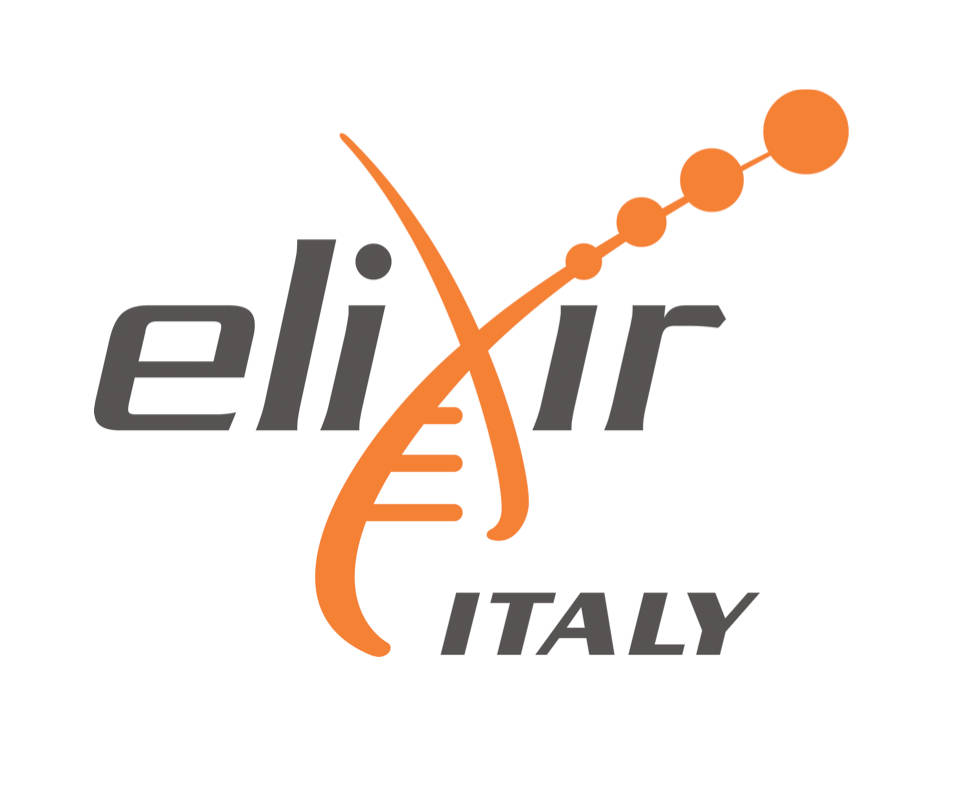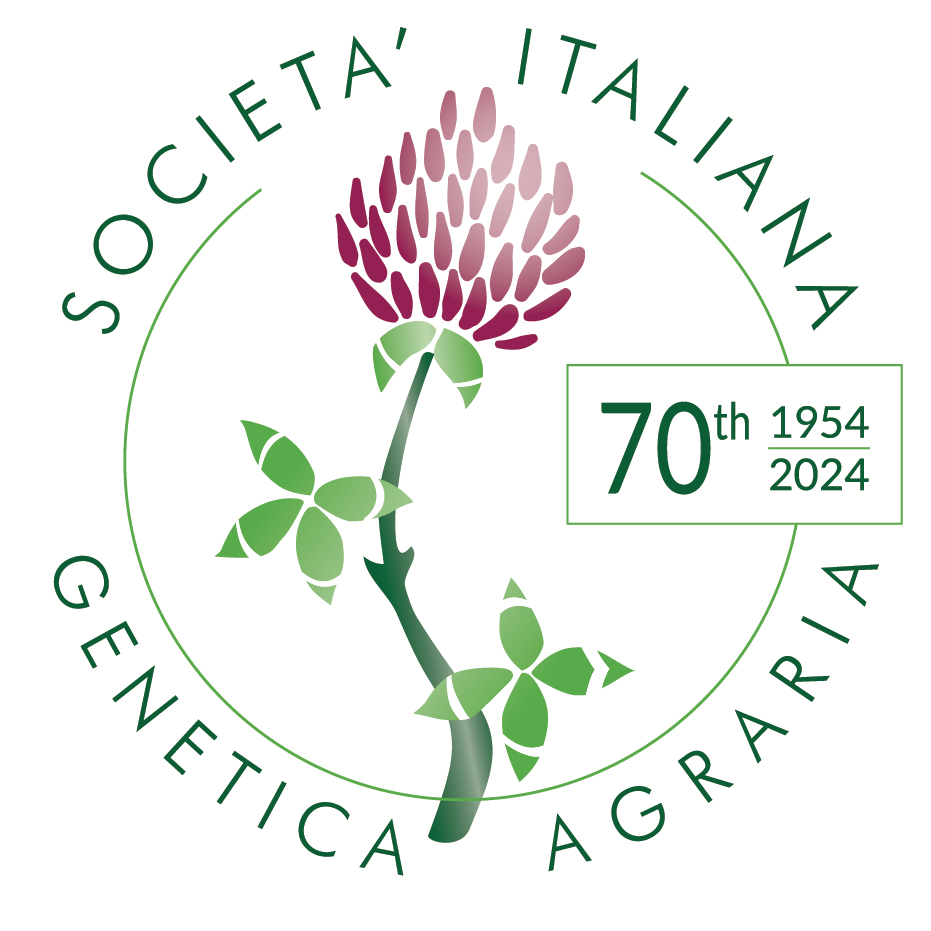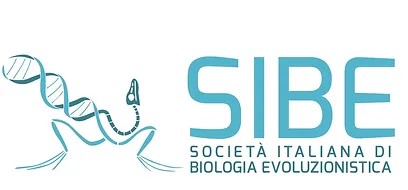Registration includes:
- Accommodation in shared room for 7 nights (IN: 10/06/2024; OUT: 17/06/2024)
- Catering (lunches, coffee breaks, dinners)
- Course materials
Payment
Successful participants will receive payment details by email.
Selection criteria
This course is aimed at evolutionary biologists with basic bioinformatics skills.
Candidates will be selected based on:
- A solid background in evolutionary genetics, since the course is advanced;
- Good knowledge of Linux operating system, R and basic shell commands, Python knowledge is a plus;
- Lack of previous knowledge of the population genomics tools taught (we want you to learn new skills);
- Opportunity to apply the learning outcomes to their work soon after the course;
- Impact of the course on the participant and his/her research group (we discourage multiple applications from the same group);
- Submission of an abstract (mandatory).
Fulfilment of the above conditions by participants will be assessed through the registration form.
Abstract guidelines
Abstract guidelines: max 200 words.
To submit the abstract, access your course account after registration. Abstracts should describe participants’ research projects to be presented with a poster during the course.
Poster specifications
Poster specifications and dimensions will be sent by email to successful participants.
Additional Information for registration
It is mandatory that students attend the whole length of the course. Participants are expected to bring their own laptop; if not possible, this should be declared during registration.
Students will share rooms.
We encourage speakers and participants to take trains within Europe for distances, for e.g. under 800 km or under 6–8 hours of travel time to promote the reduction in CO2 emissions in order to lessen environmental impact.
Travel grants and registration fee waivers
Travel grants and registration fee waivers are available for participants.
Selection of awardees is handled directly by the organizers. EMBO travel grants and registration fee waivers are allocated on the basis of the quality of the submitted abstract.
Applicants do not need to apply separately for these but should indicate on the registration form if they wish to be considered.
Additional travel grants are available for EMBC Associate Member States Chile, India, Singapore and Taiwan.
Special travel grants and registration fee waivers
A limited number of travel grants and registration fee waivers are availablefor scientists working in Croatia, Czech Republic, Estonia, Greece, Hungary, Italy, Lithuania, Luxembourg, Poland, Slovenia and Turkey. Grants are allocated on the basis of the quality of the submitted abstract.
A maximum of 700 Euros per participant are available to cover registration fees, travel, and accommodation (no additional subsistence costs can be covered). To apply, please indicate the itemized amount requested in the travel grants section of the registration form.
Child care grants
EMBO Courses and Workshops offers grants to offset additional childcare costs incurred by participants or speakers when participating at any EMBO Courses and Workshop funded meeting. Eligible costs include fees for a caregiver or child-care facility, travel costs for a caregiver, or travel costs for taking the child to the meeting etc. Please indicate on the registration form whether you would like to be considered for the grant. Please also describe how you intend to use the childcare grant and specify the sum that you will need.
Grant Funded by Associazione Genetica Italiana (AGI)
Two grants of 500 EUR each covering the registration fee of one student/post-doc who is an AGI member or works in a lab in which the PI is an AGI member, will be awarded by the AGI.
Grant Funded by Società Italiana Di Genetica Agraria (SIGA)
One grant of 500 EUR covering the registration fee of one student/post-doc who is SIGA member or works in a lab in which the PI is a SIGA member will be awarded by SIGA.
Grant Funded By Società Italiana Di Biologia Evoluzionistica (SIBE)
One grant of 500 EUR covering the registration fee of one student/post-doc who is SIBE member or works in a lab in which the PI is a SIBE member will be awarded by SIBE.
It Support By ReCaS-Bari
Giacinto Donvito (ELIXIR-IT, INFN - Istituto Nazionale di Fisica Nucleare, Bari)
Stefano Nicotri (INFN - Istituto Nazionale di Fisica Nucleare, Bari)
Sustainability
- Invited speakers from other continents are giving their talks remotely and we encourage speakers and participants to take trains within Europe for distances to promote the reduction in CO2 emissions in order to lessen environmental impact.
- Abstract books and programs will be shared in electronic form only, and paper badges will be used.
- Catering will include at least one vegetarian meal and locally sourced ingredients.
- Single-use plastics and plastic water bottles and disposable cutlery will be avoided.
- The hotel is equipped with a system to turn off lights and electronics when not in use.
- We will turn off lights, machines, electronics, and air conditioning when not in use.
Code of conduct
Anti-harassment and non-discrimination policy
At EMBO, we believe that harassment and discriminatory behaviour are unacceptable in any setting. EMBO's code of conduct is applicable for all participants of this EMBO meeting and can be found here.
Media and communications policy
Unpublished data may be presented at this meeting and presenters may not want their results to be communicated beyond the audience in attendance at the event. Participants must seek approval from the presenter before quoting or passing on any of the data presented. Furthermore, the recording or communication of the scientific content presented (e.g. talks, discussion sessions or posters) by audio, video, photographs or any other means, or communication via social media needs to be agreed upon by all concerned. Attendees violating this Code of Conduct may be asked to leave the practical course without a refund at the sole discretion of the organisers. Attendees are expected to respect the media and communications policy during this EMBO Practical Course.





